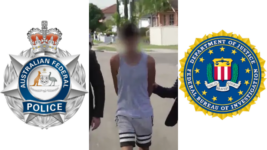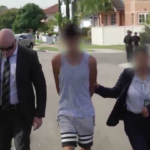Manufacturing Terrorists: Fabricating Domestic Threats to Justify Foreign Policy

Domestic terrorism and a mounting scare campaign about it has hit our TV screens over the last fortnight or so, as a 16-year-old Muslim boy who stabbed a priest was branded a terrorist by NSW police, and the force then managed to locate six other teen terrorists, including one as young as 14.
An air of dubiousness has pervaded the operation, as people from Sydney’s Muslim communities reflect on whether our city has suddenly been cast back a decade ago, when the Abbott government was enacting terrorism laws, with accompanying police raids providing clear justification for them.
To raise suspicions about the validity of terrorism cases has clear precedence since The Guardian published details about a case in February, which involved charges laid against a 14-year-old being dropped last October, when it became clear that AFP agents had been grooming the terrorism suspect.
The idea that certain Australian federal police officers had been manufacturing terrorism suspects to be charged and tried, might easily be dismissed as conspiratorial and put down to certain officers making misguided decisions. Yet, repeated similar cases in the US tell a different tale.
And with recent AUKUS developments suggesting this nation’s foreign policy is governed by the US, one might question whether producing domestic terrorists to justify foreign policy positions or conflicts, plus a more authoritarian rule at home, is part of the overall package.
How about killing a cop?
The recent AFP investigation that raised eyebrows over its legitimacy involved a 13-year-old autistic boy’s parents contacting Victoria police in 2021, seeking assistance as their son, referred to as TC in court, had developed an obsession with the Islamic State.
In response, Victoria police provided the boy with countering violent extremism (CVE) support, while, the Joint Counter Terrorism Team (JCTT), comprised of AFP, ASIO and VicPol agents, began a covert operation involving two different personae suggesting the teen partake in terrorism planning.
Greens Senator David Shoebridge grilled the AFP deputy commissioner Ian McCartney, who authorised the operation regarding the case, which included his agents suggesting the boy, with an IQ of 71, might consider building a bomb or even killing one of the force’s own officers.
McCartney told Shoebridge in February that the decision to pursue the case in this manner “was not taken lightly” but “there were a set of exceptional circumstances” involved, as there was an “escalation of threat” supposedly, which led to a “need to protect the community”.
But Victorian Magistrate Lesley Fleming found the AFP officers’ actions were “profoundly short of the minimum standards”, which had included them waiting until the boy turned 14 to charge him in order to make the offences stick, as it’s harder to argue a 13-year-old is criminally responsible.
“The court found that it was the AFP that was radicalising the child,” Shoebridge said, in addressing the deputy. “The radicalisation was happening as a result of the actions of your own officers. Do you accept the magistrate’s finding?” And McCartney did accept his agency had acted in this manner.
The American way
Writing in The Intercept mid-last year, Murtaza Hussain raised a recent US case that is startlingly similar to the AFP fiasco, and, as the journalist further points out, cases that suggest the manufacturing of terrorists are nothing new in the land of the free.
The fresh example, which occurred in Massachusetts, involved an FBI agent befriending a 16-year-old online, and suggesting, over the course of two years, that he make monetary contributions, $25 a pop, to assist in funding the Islamic State.
The boy, who had developmental issues, also twice pulled out of plans that involved him flying overseas to join the terrorist group he was supposedly in contact with.
And although he’d been charged with funding a terror organisation, it was pointed out that he’d only provided funding to the FBI. And in fact, in the latter period of the operation, the boy contacted the FBI repeatedly, attempting to dob in the “terrorists” he was in contact with.
“This law enforcement tactic has been criticised by national security researchers, who have scrutinised the FBI’s role in manufacturing terrorism cases using vulnerable people, who would have been unable to commit crimes without prolonged government assistance,” asserts Hussain.
The journalist also reported on a similar case in 2016, involving an 18-year-old with serious mental health issues arrested over a terror conspiracy, after the FBI had spent years communicating with him.
And like our recent local case, the boy’s parents in this last case initially contacted the FBI for assistance.
The terrorism assembly line
So pervasive is the issue of manufacturing terror in the States that Human Rights Watch produced the Illusion of Justice: Human Rights Abuses in US Terrorism Prosecutions report, which documents 27 cases involving US agents failing on their international duty to carry out impartial investigations.
HRW found that on a number of occasions, US law enforcement had aggressively pursued “terrorism threats before they even materialise”, with agents overstepping the mark in terms of assisting in plotting terrorism, and in two cases, even offering suspects money to engage in such planning.
Issues identified included “targeting people with mental or intellectual disabilities in stings”, obtaining evidence via coercion and abusive detention conditions.
And, unsurprisingly, as these operations targeted Islamic adherents, they were having an adverse effect on American Muslim communities.
HRW outlines that in these cases, the defence of entrapment, or being tricked into committing a crime, is open to US defendants, however this then leads the prosecution to speculate on whether the suspect had a prior disposition to terrorism and the defence had never been successful.
But in the case of the 14-year-old boy groomed to be a terrorist by the AFP, he would not have been able to argue such a defence if the charges had stuck because in Australia the defence of entrapment is not officially open to the accused.
As occurred in this instance, however, charges can be dropped if a case appears to involve such provocation.
The supposed terror within
The JCCT carried out multiple terror raids across western Sydney on 24 April, which involved 400 officers being deployed to 13 locations, with the all suspects arrested consisting of teenage Muslim boys aged from 14 to 17, with six taken in and charged.
And the public is now being asked to consider that, following NSW police commissioner Karen Webb deeming a teen who stabbed a priest a terrorist at 1.35 am on the same night, the boy and his close friends made up a terror network, and his mates are now facing terror thought crime charges.
At the turn of the century, terrorism became a domestic issue following the 2001 9/11 attacks in New York and the 2002 Bali Bombings, which killed 88 Australians. And this led to the first wave of Australian terror raids, while the nation was involved in the war on terror in Iraq and Afghanistan.
Early last decade, terrorism was front and centre once more with the rise of the Islamic State. There was a focus on preventing civilians from leaving the country to fight for ISIS in the Middle East, which is when terror raids again become part of the Australian psyche.
And the question NSW is now left asking is, whether the local grassroots pro-Palestinian movement, which is completely at odds with the government’s official position on the Israeli-perpetrated genocide in Gaza, is causing so much of a headache for authorities, that a terror scare is warranted.







